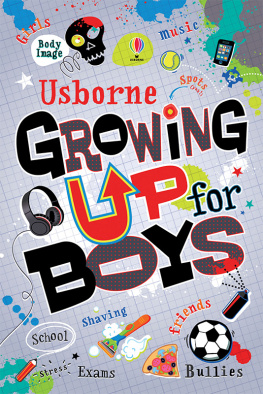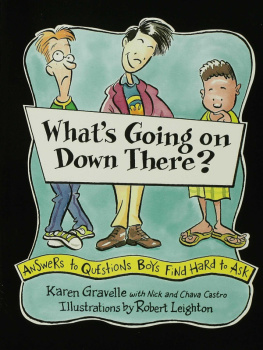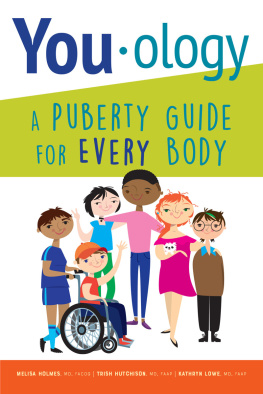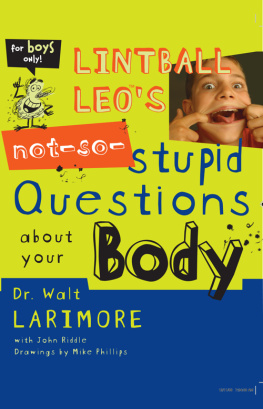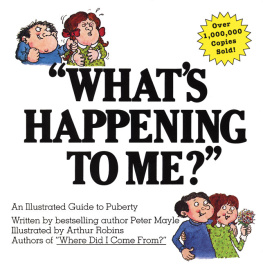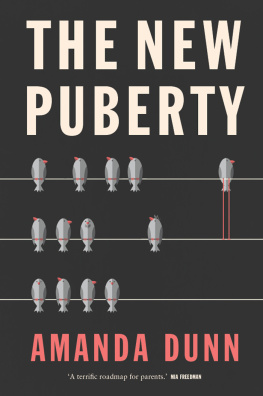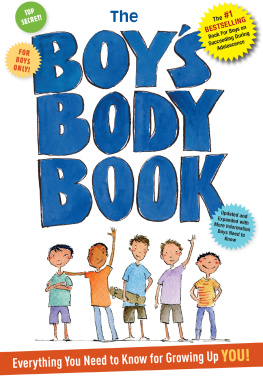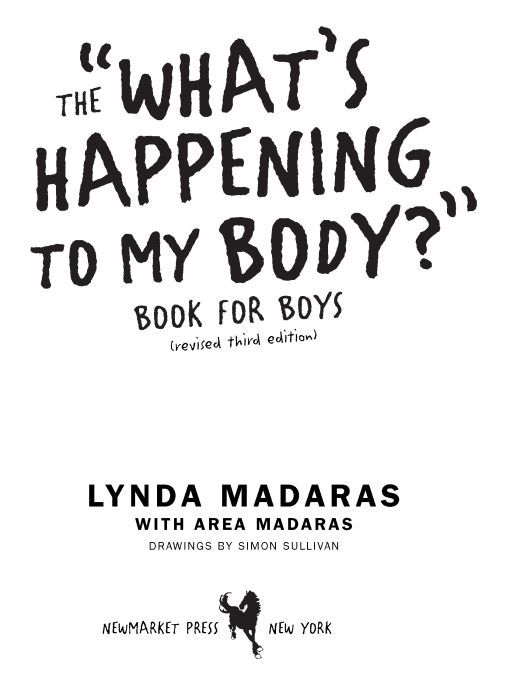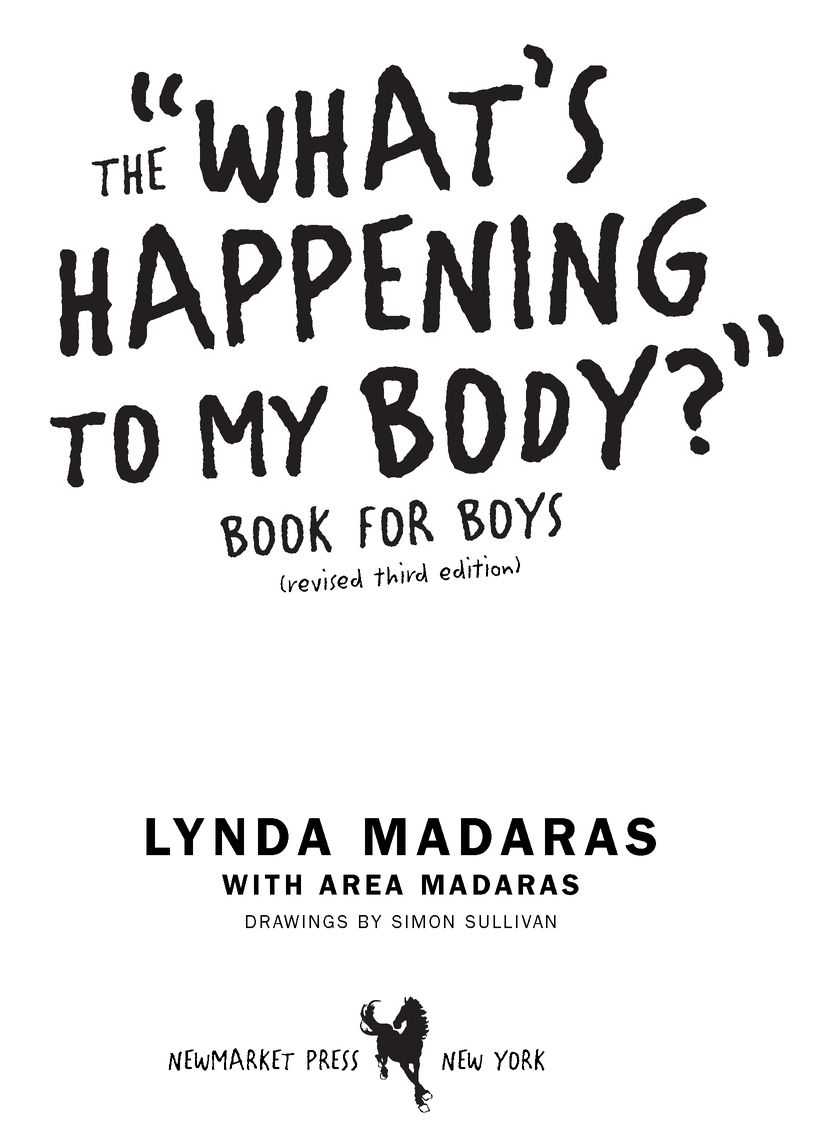Table of Contents
On Your Mark, Get Set, Grow!
A WHATS HAPPENING TO MY BODY? BOOK FOR YOUNGER BOYS
Ready, Set, Grow!
A WHATS HAPPENING TO MY BODY? BOOK FOR YOUNGER GIRLS
My Body, My Self for Boys
AND AREA MADARAS
My Body, My Self for Girls
AND AREA MADARAS
My Feelings, My Self: A Growing-Up Guide for Girls
AND AREA MADARAS
The Whats Happening to My Body? Book for Girls
WITH AREA MADARAS
Lynda Madaras Talks to Teens About AIDS: An Essential Guide for Parents, Teachers, and Young People
Womancare: A Gynecological Guide to Your Body
WITH JANE PATTERSON, M.D.
Woman Doctor: The Education of Jane Patterson, M.D.
WITH JANE PATTERSON, M.D.
Great Expectations
WITH LEIGH ADAMS
The Alphabet Connection
WITH PAM PALEWICZ-ROUSSEAU
Childs Play
by Martin Anderson, M.D., M.P.H.
Unfortunately, teenagers dont come equipped with owners manuals like new cars do. Both are high performance, occasionally high maintenance, and can be difficult to start, steer, and stop. One major roadblock in parent-teen communication is that each side doesnt know what to expect from the other. Parents usually teach their children based on how they themselves were taught. This works well for throwing a ball, fishing, changing the oil in a car, cooking, etc., but fails in the area of sexuality and pubertal development. Parents often werent taught these subjects by their own parents and therefore they have no model to draw from when teaching their children.
Lynda Madarass book functions equally well as an owners manual for teens and as a teaching guide for their parents. I strongly agree with the author when she suggests that this book should be read by parents and teens/preteens together. This informative volume prepares both teens and their parents for the changes that are coming, and the book is a great resource for teens later on when they have questions about their bodies.
I have had the pleasure of leading several father/son sessions on puberty/growth/development for fifth-grade boys and their dads. The substance of the presentations and what transpires during the sessions are far less important than discussions that occur on the way home and later. Parents and their teens often need something to initiate these discussions. Lynda Madarass book is an excellent starting place for these discussions.
For teens reading this, remember that parents are often just as uncomfortable as you are, if not more so. Believe it or not, they went through puberty just as you are now. Ask them about their experiences. You might just learn something and, if not, think of the embarrassing information you will find out about your parents. Now you can get even with them for showing your naked baby pictures to your first date.
In summary, Lynda Madarass book is an invaluable resource for teens and their parents. Both teens and their parents can benefit a great deal from reading this book. It is one of the classic books I keep on hand to lend parents or teens when they ask for resources to help understand adolescence.
MARTIN ANDERSON, M.D., M.P.H.
Director of Adolescent Medicine
UCLA Department of Pediatrics
Los Angeles, California
Toward the end of the school year, I give each of the boys and girls in my sex-education classes a raw egg with the assignment to treat it as their baby for one week. When you forget to bring your lunch money or gym clothes or math book to school, nothing terrible happens, I tell them. But if you forget to bring your baby to school even once, its dead and youre out of the game.At the end of the week, I take all surviving babies and their parents out to lunch.
The egg babies in my classes do not fare well. Most die of multiple fractures soon after birth.
I get a real kick out of watching what goes on at school during the week of this homework assignment. There are always a couple of boys who try, without success, to get one of the girls to care for their babies. But there are also the boys who take their parenting very seriously. Ill see them out on the patio at lunch, four or five boys eating together and caring for their egg babies. Theyll be chatting away, comparing notes and trading tales of barely averted childhood disasters.
It always surprises me that so many boys get involved in this game. The sight of a hulking fifteen-year-old with the build of a football player trotting across the campus with his egg baby tenderly tucked in a carefully constructed milk-carton cradle never fails to amaze me.
The thinking behind the egg-baby assignment is, of course, to give kids some idea of the responsibilities involved in parenthood and, I always hope, to make them think twice about risking a pregnancy. But even if the assignment never prevents a single teenage pregnancy, the kids have fun, and I like to think they learn from it. More important, perhaps, it teaches us something about the confusing contradictions young boys must deal with as they move into manhood.
I find that the boys who spend hours lovingly fashioning cribs and cradles are the very same boys who come up to me before class, giggling and pushing at me dog-eared copies of whatever racy, adolescent paperback novel has been making the rounds of late. Read this, read this, they insist, the books open to pages on which the good parts have been underlined in red. The women in these novels are forever ripping open their blouses and begging the hero to have his way with them. The hero, being a gentleman, obliges.
I always tell the boys that neither my sex life nor the sex life of anyone I know on the planet proceeds along the lines described in these books. Then we talk about the real-life fears and uncertainties most people have in regard to sex, and about the emotional feelings involved in being sexual with another person.
The issue Im trying to get at here is that this culture poses some rather tricky problems for young boys trying to find their way into manhood. On the one hand, they have a tender, caring sidethe side I see so clearly when theyre playing the egg-baby game. On the other hand, they are confronted with all these thrilling and titillating images of a conquering, tough-guy male sexuality, which doesnt allow much room for anybodys tender or caring side.
It must be hard for a boy to sort this out, which undoubtedly accounts for a large portion of adolescent male angst. During childhood, boys generally are allowed some room to act out their tender side. But at adolescence, they move into the strange world of male adulthood in which it appears that real men are not noted for their tenderness, real men dont cry or ever feel uncertain about who they are or what theyre supposed to do, real men always know the right sexual moves to make, real men are always knowledgeable and supremely confident about sex and life in general. Whew!
To top it all off, just as theyre moving from childhood into this confusing world of manhood, all these strange changes start happening to their bodies. And chances are that nobody around them will be willing to explain these changes in any but the most cursory way, if at all.


